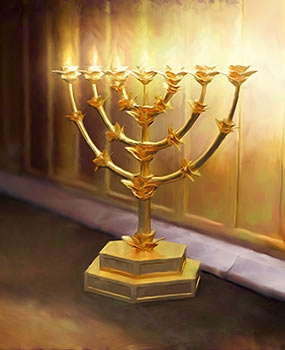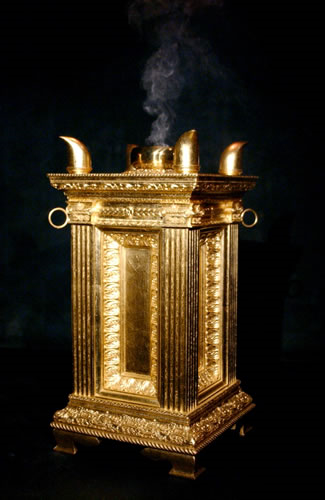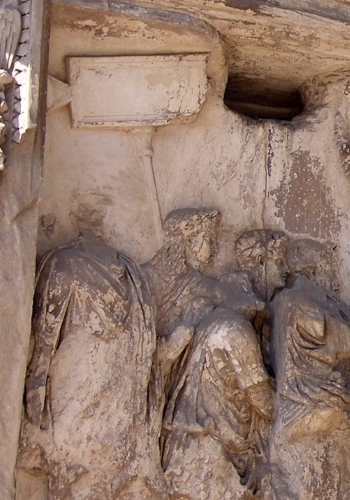
 |

 |
| Mᵊnōr•âhꞋ (modern replica) |
Mōsh•ëhꞋ set ha-Mᵊnōr•âhꞋ in the ŌꞋhël Mō•eidꞋ, in front of ha-Shū•lᵊkh•ânꞋ midway-along![]() ha-Mi•shᵊkânꞋ on the south side.
ha-Mi•shᵊkânꞋ on the south side.
Then he primed the neir•ōtꞋ before é‑‑ä; according as é‑‑ä tzi•wâhꞋ Mōsh•ëhꞋ.
 |
| Mi•zᵊbakhꞋ ha-QᵊtōrꞋët |
Next, he set Mi•zᵊbakhꞋ ha-Zâ•hâvꞋ (ha-QᵊtōrꞋët) outside the doorway of the ŌꞋhël Mō•eidꞋ, in front of the Pâ•rōkhꞋët. Then he yi•qᵊteirꞋ on it— qᵊtōrꞋët sam•imꞋ; according as é‑‑ä tzi•wâhꞋ Mōsh•ëhꞋ.
 0350x263.jpg) |
Then he hung the screen door of the pëtꞋakh to the Mi•shᵊkânꞋ, and set the Mi•zᵊbakhꞋ hâ-Ōl•âhꞋ proximate to the pëtꞋakh Mi•shᵊkânꞋ ŌꞋhël Mō•eidꞋ.
Waya•alꞋ al•avꞋ hâ-Ōl•âhꞋ and ha-Mi•nᵊkh•âhꞋ; according as é‑‑ä tzi•wâhꞋ Mōsh•ëhꞋ.
 350x264.jpg) |
Then he placed the Ki•yōrꞋ between the ŌꞋhël Mō•eidꞋ and ha-Mi•zᵊbeiꞋakh, in which he provided water for washing. So Mōsh•ëhꞋ, A•ha•rōnꞋ and his bân•im washed their hands and feet therein.![]()
Whenever they came to the ŌꞋhël Mō•eidꞋ, as they appproached ha-Mi•zᵊbeiꞋakh, they washed; according as é‑‑ä tzi•wâhꞋ Mōsh•ëhꞋ.
Then he erected hëh-Khâ•tzeirꞋ around the Mi•shᵊkânꞋ and Mi•zᵊbeiꞋakh, and hung the screen door of the shaꞋar of hëh-Khâ•tzeirꞋ.
Thus, Mōsh•ëhꞋ finished ha-mᵊlâkh•âhꞋ.
Then Ân•ânꞋ of incense enshrouded the Pâ•rōkhꞋët-screen door of the ŌꞋhël Mō•eidꞋ; and the Kâ•vōdꞋ é‑‑ä filled ha-Mi•shᵊkânꞋ.![]()
So Mōsh•ëhꞋ couldn’t come to the ŌꞋhël Mō•eidꞋ because hëh-Ân•ânꞋ shâ•khanꞋ upon it—the Kâ•vōdꞋ é‑‑ä filled ha-Mi•shᵊkânꞋ.![]()
 |
So, in all their journeys, whenever hëh-Ân•ânꞋ from Mi•zᵊbakhꞋ ha-Zâ•hâvꞋ (ha-QᵊtōrꞋët) was raised-up in their Ma•khᵊt•âhꞋ![]() above ha-Mi•shᵊkânꞋ, Bᵊn•eiꞋ-Yi•sᵊrâ•eilꞋ journeyed.
above ha-Mi•shᵊkânꞋ, Bᵊn•eiꞋ-Yi•sᵊrâ•eilꞋ journeyed.
But if hëh-Ân•ânꞋ from Mi•zᵊbakhꞋ ha-Zâ•hâvꞋ (ha-QᵊtōrꞋët) wasn’t raised-up in their Ma•khᵊt•âhꞋ![]() , they didn’t journey until the day it was raised up.
, they didn’t journey until the day it was raised up.
For Ân•ânꞋ é‑‑ä is upon ha-Mi•shᵊkânꞋ![]() by day,
by day,![]() , but the eish Itself shall be within by night
, but the eish Itself shall be within by night![]() —for the eyes of all Beit Yi•sᵊr•â•eilꞋ, in all of their journeys.
—for the eyes of all Beit Yi•sᵊr•â•eilꞋ, in all of their journeys.

Optional parental preparation:
Burn incense — To enhance a closer experience to the ancient practice, why not light a frankincense & myrrh incense stick before the neir•ōtꞋ Sha•bâtꞋ, to make Sha•bâtꞋ even more of an xoneg? ![]()
Desert tribes walking in sandals before the advent of baths, showers or deoderant, especially in summer heat that often tops 32°C (90°F), regarded this as customary before entering a home or eating bread (which accompanied, and implied, a substantial meal). ![]()
Ân•ânꞋ — symbolized the Kâ•vōdꞋ é‑‑ä (i.e. Shᵊkhin•âhꞋ), which was transferred, in the Form of the A•rōnꞋ ha-Bᵊrit, to the Beit ha-Mi•qᵊdâshꞋ hâ-Rish•ōnꞋ, from which Yᵊkhë•zᵊq•eilꞋ ha-Nâ•viꞋ witnessed and documented Its departure in B.C.E. 591![]() (Yᵊkhë•zᵊq•eilꞋ 10.1-22). It never returned to the Second Beit ha-Mi•qᵊdâshꞋ of Herod. Rather, from Its departure (probably identical with the disappearance of the A•rōnꞋ ha-Bᵊrit) in B.C.E. 591, the Spiritual Shᵊkhin•âhꞋ has been recognized as dwelling within the heart of those who are Ta•na"khꞋ-centric.
(Yᵊkhë•zᵊq•eilꞋ 10.1-22). It never returned to the Second Beit ha-Mi•qᵊdâshꞋ of Herod. Rather, from Its departure (probably identical with the disappearance of the A•rōnꞋ ha-Bᵊrit) in B.C.E. 591, the Spiritual Shᵊkhin•âhꞋ has been recognized as dwelling within the heart of those who are Ta•na"khꞋ-centric. ![]()
Kâ•vōdꞋ é‑‑ä — is equated to the ân•ânꞋ sam•imꞋ (incense-smoke). Since the Mi•zᵊbakhꞋ ha-Zâ•hâvꞋ, upon which the incense was burned, stood right in the doorway entrance to the ŌꞋhël Mō•eidꞋ, an intensity of the ân•ânꞋ could make breathing difficult when entering; as well as fill the entire tent with the ân•ânꞋ when the breeze was out of the east (i.e. blowing the ân•ânꞋ into the tent). ![]()
Questions you might anticipate that your child might raise and be prepared to discuss:
What does “proximate” mean?
What does it mean to journey?
![]()
 |
 |